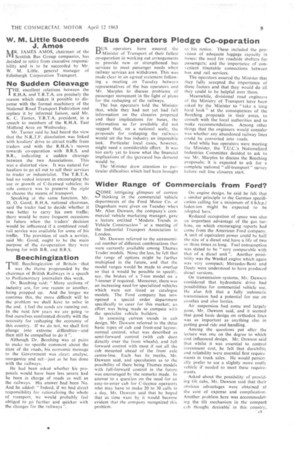W. M. Little Succeeds J. Amos
Page 11

If you've noticed an error in this article please click here to report it so we can fix it.
MR. JAMES AMOS, chairman of the IV/ Scottish Bus Group companies, has decided to retire from executive responsibility and is to be succeeded by Mr. W. M. Little, general manager of Edinburgh Corporation Transport.
No Sudden Cleavage
THE excellent relations between the R.H.A. and T.R.T.A. are precisely the reason which makes it possible to dispense with the formal machinery of the National Road Transport Federation and replace it by informal liaison, said Mr. K. C. Turner, T.R.T.A. president, in a speech to members of the R.H.A. East Midland Area on Wednesday.
Mr. Turner said he had heard the view that the N.R.T.F. dissolution was linked with hauliers' drive to attract traffic from traders and with the R.H.A.'s moves towards co-operation with B.R.S. and B.R., indicating a sudden cleavage between the two Associations. This was a distorted view. It was natural for hauliers to go all out to sell their services to trader or industrialist. The T.R.T.A. had no vested interest in encouraging the use or growth of C-licensed vehicles; its sole concern was to preserve the right to choose the means of transport. Speaking at the same function, Mr. 13. 0. Good, R.H.A. national chairman, said the trader had to decide 'whether it was better to carry his own traffic; there would he more frequent occasions in future when the traders' decision would be influenced if a combined road/ rail service was available for some of his traffic. The provision of such a service, said Mr. Good, ought to he the main purpose of the co-operation they were hoping for with B.R. and B.R.S.
Beech i ngization
THE Beechingization of Britain—that was the theme propounded by the chairman of British Railways in a speech to Parliamentary journalists this week. Dr. Beeching said: "Many sections of industry are, for one reason or another, being propped up. And the longer we continue this, the more difficult will be the problem we shall have to solve in the end. I feel the sands are running out. In the next few years we are going to find ourselves confronted directly with the necessity for reshaping the econotny of this country. If we do not, we shall first plunge into extreme difficulties—and then still be compelled to do it ". Although Dr. Beeching was at pains to make no specific comment about the state of the roads, his economic message to the Government was clear; analyse, reorganize and act—just as he has done with the railways. He had been asked whether his proposals would have been less severe had he been in charge of roads as well as the railways. His answer had been Nn. And he added: Indeed, if we had direct responsibility for rationalizing the whole of transport, we would probably feel obliged to go further and quicker with the changes for the railways".








































































































